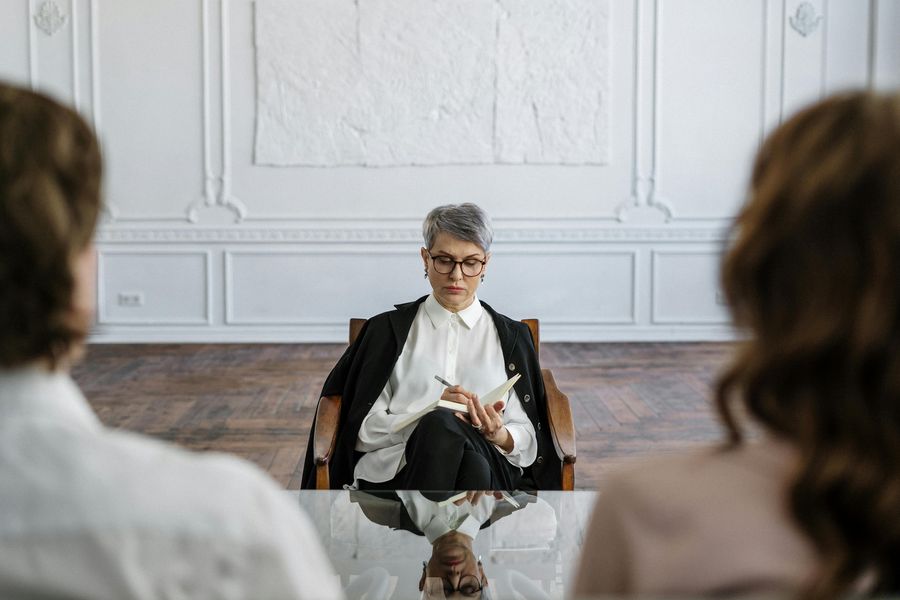Building Positive Relationships: Tips and Characteristics
Building a positive relationship takes time and effort, but the rewards are worth it. Positive relationships bring joy, stability, and support to each other’s lives.
But what are the keys to building a positive relationship? In this article, we’ll explore some practical tips and key characteristics that can help you build healthier, more positive, and meaningful relationships.
Importance of Being Present
Presence is about being “here” right now, not just in body but also in mind. In the age of smartphones and social media, it’s easy to be distracted while talking to someone.
We check our phones, look around, or zone out while someone’s talking. However, being present means giving your full attention to the other person.
It means putting away your phone, looking into their eyes, and really listening to what they have to say. Being present is the foundation of any good relationship.
When we are fully present, we are more aware of the other person’s needs and feelings. We are more invested in the conversation.
We can also respond in a more authentic and meaningful way. Using “We” Instead of “I” or “You”
When we use “we,” we create a sense of unity and partnership in our relationships.
Using “we” shows that you are a team and that you’re in this together. It brings a sense of shared responsibility and ownership.
On the other hand, using “I” or “you” can create distance and defensiveness. For example, instead of saying, “you always make me feel bad,” try saying, “we could work on understanding each other’s needs better.” This simple shift can change the tone of the conversation and promote collaboration.
Practicing Active Listening
Active listening is the art of not just hearing the words but also understanding the intent and emotion behind them. Active listening requires focus and empathy.
It means putting aside your own thoughts and feelings and really tuning in to what the other person is saying. When we actively listen, we show the other person that we value their thoughts and feelings.
We also create a safe space for them to share what’s on their mind. Active listening builds trust and understanding, which are the foundation of any meaningful relationship.
Seeking to Understand the Other Person
Each person comes from a unique background with different experiences, values, and perspectives. Seeking to understand the other person means seeing things from their point of view.
It means respecting their opinions and feelings, even if they don’t align with our own. When we seek to understand, we can build stronger relationships based on trust and respect.
Instead of judging or criticizing, we can ask questions, listen, and learn from each other. Seeking to understand also means being willing to compromise and find solutions that work for both parties.
Setting Healthy Boundaries
Boundaries are essential for maintaining a healthy relationship with yourself and others. Healthy boundaries mean knowing your limits and communicating them effectively.
It means being clear about what you need and what you’re not okay with. When we set healthy boundaries, we show others how to treat us.
We also protect ourselves from harmful situations and relationships. Setting boundaries is an act of self-care and self-respect.
Respecting a Person’s Alone Time and Need for Space
Everyone needs alone time to recharge, process their thoughts, and pursue hobbies or interests on their own. Respecting a person’s alone time means giving them the space they need without making them feel guilty or unloved.
It also means understanding that they need space to be themselves and pursue their individual goals. Allowing space in a relationship is healthy and promotes independence.
It also allows each person to bring their best selves to the relationship when they are together.
Letting Go of the Past
Holding on to grudges or resentments from the past can prevent a relationship from moving forward. Letting go means forgiving, moving on and focusing on what’s important: building a positive future.
Forgiveness liberates us from negative emotions and brings peace to the relationship.
Connecting with Partner’s Friends and Family
Positive relationships don’t exist in a vacuum.
Connecting with your partner’s friends and family means building a support system for both of you. It also means creating a sense of inclusivity and harmony within the broader community.
Physically Connecting Often
Physical touch is essential to building and maintaining a healthy, positive relationship. Touch releases feel-good hormones and helps us bond with each other.
Whether it’s holding hands, hugging, or cuddling, physical touch is a powerful way to express love and affection.
Fighting Fair
No relationship is without conflict, but how we handle it matters. Fighting fair means sticking to the topic at hand and avoiding personal attacks.
It also means taking responsibility for our part in the conflict and seeking a solution that works for both parties.
Doing Small Things Together
Shared experiences and quality time are the building blocks of positive relationships. Doing small things together, like cooking, watching a movie, or going for a walk, creates shared memories and strengthens the bond between two people.
Practicing Acceptance and Not Trying to Change People
It’s important to remember that everyone has their own unique strengths and weaknesses. When we try to change people, we undermine their individuality.
Instead, we can practice acceptance and focus on each other’s positive qualities. Acceptance promotes respect, diversity and individuality in a relationship.
Being a Shoulder to Lean on (stop giving advice all the time!)
Sometimes, all we need is for someone to listen and be there for us, rather than telling us what to do. Being a shoulder to lean on is about providing emotional support, listening without judgment, and showing empathy.
Being Responsible for Yourself
Responsibility means being accountable for your own actions and choices. Being responsible for ourselves means taking care of our own needs, pursuing our own goals and seeking self-sufficiency.
When we take responsibility for ourselves, we become more self-aware and present in the relationship.
Speaking Well of Your Partner
Positive relationships are built on positivity and appreciation. Speaking well of your partner means acknowledging their strengths and accomplishments.
It also means showing respect and admiration for who they are as a person.
Dividing Responsibilities Equally
Equal division of responsibilities promotes teamwork and cooperation in a relationship. Each person should contribute according to their skills and availability.
Fair division of responsibilities ensures balance and equity in a positive relationship.
Asking your partner, “what do you need from me?”
Communication is essential to building and maintaining a positive relationship.
Asking your partner “what do you need from me?” promotes open dialogue and shows that you care about their feelings and needs.
Avoiding Over Analyzing the Relationship
Over-analyzing a relationship can create unnecessary stress and anxiety. A healthy relationship evolves and changes over time.
Avoiding over-analyzing means accepting that there will be ups and downs and maintaining a positive perspective.
Practicing Gratitude
Gratitude is about appreciating the positive aspects of a relationship. By practicing gratitude, we focus on the good things in our lives and create a positive narrative for our relationships.
Staying Positive, Fun, and Playful
Positive relationships also require a sense of fun, novelty and playfulness. Shared laughter and good memories create positive, lasting impressions in a relationship.
Being playful and finding joy in each other’s company promotes bonding and affection.
In conclusion, building a positive relationship requires effort, investment, and patience.
By implementing these tips and focusing on these key characteristics, we can create stronger, healthier, and more positive relationships in our lives. Remember to be present, seek to understand, respect boundaries and create a shared sense of unity.
Ultimately, building positive relationships enriches our lives, supports our growth and brings lasting joy to ourselves and those we care about. Positive relationships are vital to our health and well-being.
Benefits of Positive Relationships
Whether it’s in our personal lives, our work lives, or our communities, we all benefit from positive relationships. In this article, we’ll explore some of the benefits of positive relationships, and we’ll give you practical tips for building a positive relationship.
Improved Overall Health and Wellbeing
Positive relationships can have a significant impact on our health and wellbeing. Research has shown that people who have positive relationships experience better physical health, a reduced risk of chronic diseases, and lower rates of depression and anxiety.
Positive relationships foster well-being by providing emotional support, positive feedback, and a sense of belonging. Having a support system is especially important during difficult times.
When we have someone to turn to when we’re stressed or feeling overwhelmed, we experience less anxiety and depression. Positive relationships promote mental and emotional resilience, which can be crucial during challenging times.
Increased Social Support
Positive relationships offer social support, which is critical to our well-being. In times of stress, we need a network of supportive people around us who can provide emotional and practical support.
Positive relationships also help us feel less isolated and lonely. Strong social connections can also help us overcome life’s challenges.
Having someone to talk to and rely on during tough times can help us work through problems and find solutions. Social support reinforces our sense of belonging and our place in the world.
Greater Sense of Purpose and Meaning
Positive relationships enhance our sense of purpose and meaning in life. When we feel connected to others, we feel like we have a role to play in our community.
We are more likely to find fulfillment in our lives when we have meaningful relationships. Positive relationships also bring a greater sense of self-worth and self-esteem.
When we feel valued and appreciated by others, we feel better about ourselves. This sense of validation can be especially important during challenging times.
Better Communication and Conflict Resolution Skills
Positive relationships foster better communication and conflict resolution skills. When we have a strong foundation of trust and mutual respect in our relationships, we’re more likely to communicate honestly and openly.
This means we’re better equipped to address problems and find solutions together. Conflict is common in any relationship, but how we handle it is what makes the difference.
When we have strong relationships, we’re more likely to approach conflict with empathy, understanding, and problem-solving skills. Conflict resolution skills strengthen relationships, promoting resilience and emotional support.
Tips for Building a Positive Relationship
Now that we’ve explored the positive benefits of relationships, let’s look at some practical tips for building positive relationships.
Show up Fully and Be Present
Showing up fully and being present is a vital component of positive relationships. Being present means giving your full attention to the other person.
It means putting away your phone, avoiding multitasking, and tuning in to the other person. Being present shows the other person that you value them and respect their time.
When we are present, we’re more likely to listen and respond authentically, promoting deeper connections and stronger bonds.
Learn to Listen Actively
Active listening is an important skill for positive relationships. Active listening means giving our full attention to the other person and hearing them out completely.
It’s about focusing on their message, rather than thinking about our own response. Active listening strengthens relationships by promoting empathy and understanding.
This skill helps us validate and appreciate the other person’s perspective, promoting respect and mutual trust.
Set Healthy Boundaries
Setting healthy boundaries is crucial for positive relationships. Boundaries help us define our limits in a relationship and communicate them effectively.
When we set healthy boundaries, we show the other person how to treat us. Healthy boundaries are an act of self-care and self-respect.
They ensure that our needs are met, promoting better mental and emotional health. Effective communication about boundaries ensures that everyone’s needs are taken into consideration, promoting a sense of trust and mutual respect.
Speak Well of Your Partner
Speaking well of your partner is another essential component of positive relationships. Speaking positively promotes appreciation and respect, which reinforces the sense of trust and safety in the relationship.
Speaking well of your partner also highlights their positive qualities and accomplishments, promoting a sense of pride and support. This positive reinforcement keeps the relationship strong during difficult times.
Practice Gratitude
Gratitude is a powerful tool for building positive relationships. Practicing gratitude means focusing on what we’re thankful for in our lives and relationships.
It’s about celebrating the positive aspects of our lives and the people we love. Gratitude promotes positive feelings about our relationships, reinforcing our bonds and bringing us closer together.
When we express gratitude, we feel happier and more fulfilled, which promotes a sense of well-being.
Conclusion
Positive relationships bring many tangible benefits to our lives, including better health, emotional support, and a sense of purpose and meaning. By adopting the tips we’ve outlined in this article, you can build positive relationships that can bring lasting joy, support, and meaning to your life.
Remember to practice active listening, set healthy boundaries, and speak well of your partner. By investing time and effort into building positive relationships, you can reap the rewards of a fulfilling and happy life.
In conclusion, positive relationships are essential to our overall well-being and fulfilment in life. By practicing active listening, setting healthy boundaries, speaking positively about our partners, and showing gratitude, we can build and maintain strong and positive relationships.
Positive relationships bring social support, a sense of purpose and meaning, and better communication and conflict resolution skills, enhancing our overall mental, emotional, and physical health. By investing in these essential relationship skills, we can create stronger bonds, healthier communication, and more fulfilling relationships that bring lasting joy and happiness to our lives.



